-
U.S. and Israel were behind Stuxnet claims expert
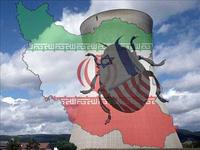
Stuxnet first came to light in July 2010. Nearly 60 percent of reported infections were inside Iran; the worm targets industrial control systems, known as programmable logic controllers (PLCs), made by Siemens; Ralph Langner told a conference in California that the malicious software was designed to cripple systems that could help build an Iranian bomb; in a recent report on Stuxnet, the security firm Symantec said that it would have taken a team of between five and ten developers, six months to create the worm; Langner said that the project would have required “inside information”, so detailed that “they probably knew the shoe size of the operator.”
-
-
Boston Dynamics developing humanoid and robot cheetah
Defense Advanced Research Projects Agency (DARPA) has awarded Boston Dynamics, an advanced robotics developer, a contract to build “Cheetah,” a fast and agile robot capable of chasing and evading; the eighteen year old engineering company is also working on a humanoid robot named “Atlas” based on the design of “PETMAN,” an anthropomorphic robot for testing chemical protection clothing used by the U.S. army
-
-
"Somethings" may be clogging counterterrorism efforts

Initiatives by DHS to encourage sports fans, shoppers, and public transportation users to “Say Something” if they notice suspicious activity may be overwhelming the system and hindering our defenses, according to a policy analyst; the recent partnership between DHS and the NBA shows DHS does not plan on holding back its call for vigilance
-
-
Rebels reject talks unless Gaddafi goes
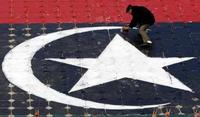
Rebels in eastern Libya have said they will not negotiate unless Col. Muammar Gaddafi quits and goes into exile; the National Libyan Council in the city of Benghazi also called again for foreign intervention to stop government air raids against the rebels; the International Criminal Court meanwhile said it would investigate Col. Gaddafi and some of his sons for crimes against humanity; President Barack Obama repeated his demand that the embattled ruler resign
-
-
Gratuitous insults: The staying power of bad ideas
The state of Tennessee will consider a bill which will make supporting Sharia law a felony; Oklahoma already has a similar measure of the books, but it is currently under judicial review; burning the Koran and declaring Sharia law to be a felony are not going to help in our war against terrorism; they will have the opposite effect; they are provocative measures which will inflame Muslims around the world; without the active support of Muslims around the world, the war against the terrorists cannot be won; one way to make sure we do not receive such support is by burning the Koran or by declaring support for Sharia law to be a felony; legislating that support for Sharia law is a felony is unnecessary; we outlaw polygamy without declaring support for Mormonism to be a felony; Hassidic Jewish men believe that they can divorced their wives simply by repeating “I divorce you” three times; we do not allow that – without declaring support for Orthodox Judaism to be a felony
-
-
In Tennessee, supporting Shariah law may soon be a felony

A Tennessee lawmaker is sponsoring a bill which would make it a felony in the state to knowingly support Shariah law; the bill, if passed, would allow the state’s attorney general to designate an entity as a Shariah organization if the organization knowingly adheres to Shariah; if the organization “engages in, or retains the capability and intent to engage in” an act of terrorism; or if the act of terrorism of the organization “threatens the security of public safety” of Tennessee residents; violations of the proposed law would be a Class B felony, punishable by fine and a prison term of up to fifteen years; a similar measure passed in November by Oklahoma voters that banned the use of Shariah law in state courtrooms was later blocked by a federal judge pending the resolution of a lawsuit calling it unconstitutional
-
-
King blasts GOP for transportation security cuts
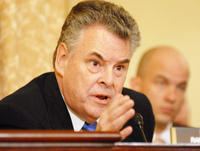
Representative Peter King (R - New York), the chairman of the House Homeland Security Committee, blasted the GOP’s plan to reduce the budget by $61 billion, citing cuts to critical anti-terror programs; the House plans to reduce spending on port security and transit facilities by $400 million, bringing total spending down to $200 million; local transit authorities say that losing federal funding would be detrimental as states and cities are struggling with their own budgets; the grants are designated for things like cameras, tunnel fortification, training, patrols, and canine teams at transport hubs and ports; proponents of the cuts believe that these programs are redundant, unnecessary, and lack sufficient oversight
-
-
Maryland wants Florida's high speed rail funds

As Republican governors in Florida, Wisconsin, and Ohio reject federal funding for high speed rail projects, states like Maryland are clamoring to receive those funds; Maryland Senators Benjamin L. Cardin and Barbara A. Mikulski sent a letter to Transportation Secretary Ray LaHood requesting that $2.4 billion dollars in high speed rail funding originally designated for Florida be redirected to projects in the Northeast Corridor; each year 250 million rail passengers use the corridor and passenger use is projected to increase by 60 percent by 2030; the White House plans to spend $53 billion on high speed rail projects over the next six years and $8 billion in the coming fiscal year alone
-
-
Alabama fire departments receive more than $1.5 million in DHS grants
The Lanier Volunteer Fire Department in Talladega County, Alabama just announced that it received a little over $100,000 from DHS through its assistance to firefighters grant program; the department’s chief Jerry Alfred said he plans to use the funds to purchase a rescue truck; several other local fire departments also received grants from DHS including the Sycamore Volunteer Fire Department which received $231,750 and the Oak Grove Volunteer Fire Department which got $185,250; DHS plans to award $1,564,732 to eighteen fire departments throughout Alabama
-
-
U.S. learning from Canada to combat domestic radicalization
The United States is partnering with Canada to learn how to better address the increasing threat from the domestic radicalization of Muslim Americans; the United States is looking to learn how Canadian law enforcement agencies have developed relationships with Muslim communities; for the past several years the Royal Canadian Mounted Police (RCMP) has been actively focusing on reaching out to Muslim communities and other groups that are the target of terrorist investigations; Canadian law enforcement and intelligence agencies placed domestic radicalization at the top of its priorities several years ago; domestic radicalization only recently became a national priority in the United States after a slew of failed attacks were perpetrated by American Muslims
-
-
ATF pushes for power to track bulk assault rifle sales

As more guns used in the bloody Mexican drug wars are traced back to the United States, efforts to crack down on illegal gun smuggling rings in border states have struggled to gain more traction; last month, the House denied the Bureau of Alcohol, Tobacco, Firearms, and Explosives (ATF) an emergency request to track bulk sales of semiautomatic guns in border states; a 2009 Government Accountability Office (GAO) report found that an estimated 85 percent of guns seized by Mexican authorities originated from the United States; a recent investigation found that traffickers were purchasing as many as forty AK-47 rifles at a time from gun shops in the Phoenix area
-
-
Gaddafi launches first major counter-attack on rebels
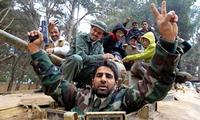
Gaddafi’s forces are escalating a counteroffensive, pushing the country closer to an all-out civil war; opponents of Gaddafi today (Wednesday) repelled an attack by the Libyan leader’s forces trying to retake Brega, a key coastal oil installation, in a topsy-turvy battle in which shells splashed in the Mediterranean and a warplane bombed a beach where rebel fighters were charging over the dunes. At least five people were killed in the fighting; the assault on the Brega oil port was the first major regime counteroffensive against the opposition-held eastern half of Libya, where the population backed by mutinous army units rose up and drove out Gaddafi’s rule over the past two weeks; a coalition of anti-government movements is considering whether to ask the UN to execute airstrikes against pro-Gaddafi forces; NATO has drawn up plans for imposing a no-fly zone over Libya, but the organization said it would implement the plan only with a UN Security Council blessing, which is unlikely because of Russia’s objections
-
-
UN Human Rights Council to praise Libya's human rights record
While the UN Security Council has imposed sanctions on Libya, the UN Human Rights Council is set to adopt a report full of praise for Libya’s human rights record; the report also contains comments on Libya by Council members: Sudan praises Libya for improving education conditions; North Korea noted Libya’s progress on economic and social rights; Saudi Arabia praised Libya for improvements in constitutional, legislative, and institutional frameworks, which “showed the importance that the country attached to human rights”; praise is also heaped on Libya by Cuba, Venezuela, Oman — and two nations whose leaders were recently ousted in the midst of Middle East unrest — Egypt and Tunisia
-
-
History: Libya and the Un Human Rights Council
In May 2010, in a secret ballot, Libya received a shocking 155 votes (out of 192 countries who are UN members) and was elected to the UN Human Rights Council; UN members were aware of Libya’s human rights practices, such as extrajudicial and summary executions, systematic use of torture, and the imposition of the death penalty for political and economic offences; UN members were also aware that Libyan agents in 1988 blew up a passenger airplane over Lockerbie, Scotland, killing 270 people, exploded a French airliner over the Sahara desert, killing 170; Gaddafi also financed and helped train dozens of terrorist organizations, supported Charles Taylor in the Liberian civil war that was responsible for more than 200,000 deaths, supported the insurgency by Fodeh Sanko in Sierra Leon — Sanko’s followers chopped off the arms and legs of more than 82,000 men, women and children in villages loyal to the government, but left them alive so the government would go bankrupt trying to take care of them — and backed Robert Mugabe of Zimbabwe, who brought hunger and devastation to that once relatively prosperous country; but then again, this is the UN
-
-
Battle lines in Libya harden
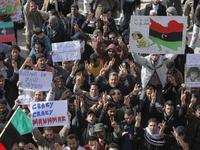
The divisions in Libya harden; the Gaddafi government reinforces its hold on the Tripoli region by transferring to the area thousands of soldiers from southern tribes loyal to Gaddafi, augmented by hundreds of mercenaries from sub-Saharan Africa; in the break-away eastern part of the country, former justice minister Mustafa Abdel-Jalil, who defected from the Gaddafi regime, announced Saturday he was setting up a provisional government; the UN Security Council imposed a series of sanctions on the Gaddafi regime and its loyalists; the UN General Assembly will debate tomorrow (Tuesday) whether to kick Libya off the UN Human Rights Council (the 47-member Council debated the Libyan situation Friday, but member states could not bring itself to criticize Gaddafi); British and German military planes landed in Libya’s desert over the weekend to rescue hundreds of oil workers and civilians stranded at remote sites; the secret military rescue missions signal the readiness of Western nations to disregard Libya’s territorial integrity when it comes to the safety of their citizens
-
More headlines
The long view
Factories First: Winning the Drone War Before It Starts
Wars are won by factories before they are won on the battlefield,Martin C. Feldmann writes, noting that the United States lacks the manufacturing depth for the coming drone age. Rectifying this situation “will take far more than procurement tweaks,” Feldmann writes. “It demands a national-level, wartime-scale industrial mobilization.”
No Nation Is an Island: The Dangers of Modern U.S. Isolationism
The resurgence of isolationist sentiment in American politics is understandable but misguided. While the desire to refocus on domestic renewal is justified, retreating from the world will not bring the security, prosperity, or sovereignty that its proponents promise. On the contrary, it invites instability, diminishes U.S. influence, and erodes the democratic order the U.S. helped forge.
Fragmented by Design: USAID’s Dismantling and the Future of American Foreign Aid
The Trump administration launched an aggressive restructuring of U.S. foreign aid, effectively dismantling the United States Agency for International Development (USAID). The humanitarian and geopolitical fallout of the demise of USAID includes shuttered clinics, destroyed food aid, and China’s growing influence in the global south. This new era of American soft power will determine how, and whether, the U.S. continues to lead in global development.
Water Wars: A Historic Agreement Between Mexico and US Is Ramping Up Border Tension
As climate change drives rising temperatures and changes in rainfall, Mexico and the US are in the middle of a conflict over water, putting an additional strain on their relationship. Partly due to constant droughts, Mexico has struggled to maintain its water deliveries for much of the last 25 years, deliveries to which it is obligated by a 1944 water-sharing agreement between the two countries.
How Disastrous Was the Trump-Putin Meeting?
In Alaska, Trump got played by Putin. Therefore, Steven Pifer writes, the European leaders and Zelensky have to “diplomatically offer suggestions to walk Trump back from a position that he does not appear to understand would be bad for Ukraine, bad for Europe, and bad for American interests. And they have to do so without setting off an explosion that could disrupt U.S.-Ukrainian and U.S.-European relations—all to the delight of Putin and the Kremlin.”
How Male Grievance Fuels Radicalization and Extremist Violence
Social extremism is evolving in reach and form. While traditional racial supremacy ideologies remain, contemporary movements are now often fueled by something more personal and emotionally resonant: male grievance.
